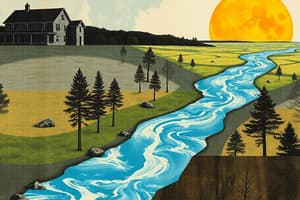Podcast
Questions and Answers
What initiates the water cycle by converting liquid water into vapor?
What initiates the water cycle by converting liquid water into vapor?
- Condensation
- Infiltration
- Evaporation (correct)
- Transpiration
What role do plants play in the water cycle?
What role do plants play in the water cycle?
- They absorb water from the atmosphere.
- They release water vapor through transpiration. (correct)
- They store water in aquifers.
- They prevent water from evaporating.
What process occurs when water vapor cools and forms tiny droplets in the atmosphere?
What process occurs when water vapor cools and forms tiny droplets in the atmosphere?
- Infiltration
- Runoff
- Condensation (correct)
- Precipitation
What happens to water droplets when clouds become saturated?
What happens to water droplets when clouds become saturated?
Which process describes the movement of water through soil layers after infiltration?
Which process describes the movement of water through soil layers after infiltration?
What is runoff in the context of the water cycle?
What is runoff in the context of the water cycle?
What is sublimation in the water cycle?
What is sublimation in the water cycle?
What occurs during deposition in the water cycle?
What occurs during deposition in the water cycle?
Flashcards
Evaporation
Evaporation
The process where heat from the sun transforms liquid water from oceans, lakes, and rivers into water vapor, which rises into the atmosphere.
Condensation
Condensation
The transformation of water vapor in the atmosphere back into tiny water droplets, forming clouds or fog.
Precipitation
Precipitation
Water from clouds that falls back to Earth's surface as rain, snow, sleet, or hail.
Infiltration
Infiltration
Signup and view all the flashcards
Percolation
Percolation
Signup and view all the flashcards
Runoff
Runoff
Signup and view all the flashcards
Collection
Collection
Signup and view all the flashcards
Groundwater Flow
Groundwater Flow
Signup and view all the flashcards
Study Notes
Water Cycle
-
Evaporation:
- Heat from the sun transforms water from oceans, lakes, and rivers into water vapor.
- Plants also release water vapor through transpiration (via stomata).
-
Condensation:
- Water vapor cools and transforms back into tiny water droplets.
- This leads to cloud and fog formation as cooler air holds less moisture.
-
Precipitation:
- Saturated clouds release water as rain, snow, sleet, or hail, based on temperature.
-
Infiltration and Percolation:
- Infiltration: Water soaks into the ground, replenishing groundwater.
- Percolation: Water moves through soil layers, reaching groundwater reservoirs (aquifers).
-
Runoff:
- Water flows across land surfaces to rivers, lakes, and oceans.
- A key process for returning water to larger bodies.
-
Collection:
- Runoff collects in rivers, lakes, and oceans, temporarily storing water.
- Water then evaporates to restart the cycle.
-
Groundwater Flow:
- Infiltrated water moves beneath the surface.
- This water eventually returns to surface water bodies.
-
Sublimation and Deposition:
- Sublimation: Ice/snow directly converts to water vapor.
- Deposition: Water vapor directly transforms into ice/snow.
-
Human Impact:
- Water usage: Over-extraction for agriculture/industry/urbanization depletes resources.
- Pollution: Contaminates water sources affecting ecosystems and humans.
- Climate change: Affects precipitation, causing more droughts/floods, and melting ice.
Studying That Suits You
Use AI to generate personalized quizzes and flashcards to suit your learning preferences.




